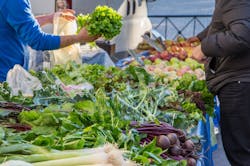Summer is upon us, and I like a good farmer’s market. The locally grown fruits and vegetables, and the occasional handmade craft, all come together in one direct-to-consumer package that sure beats sifting through the supermarket's produce aisle. Local fruit and veggie stands are a microcosm of what’s needed in today’s global marketplace—locally grown means faster time to market (your table), direct handling of products to ensure safety (freshness) and a pretty good idea by the distributor (the farmer) of what the customers need and want at any given time.
There are also less barriers to entry with less red tape, and less chance of supply chain interruptions or security breaches standing in the way of your zucchini or blueberries. You just really need to trust the farmer.
The global marketplace seldom enjoys such convenience. Oil and gas are frequent targets for politically motivated supply disruptions. Electronics often face tariffs. Meanwhile, the growing lithium-ion battery market faces several obstacles to an efficient and trustworthy supply chain.
Process automation technologies ease the woes of the processing and manufacturing sectors to get their products to market. However, more than 80% of all automation products used in the world are manufactured in China, according to electronics manufacturer AVG/EZ Automation. In May, the Biden administration announced plans for tariff increases on goods from China, categorizing it as a step to accelerate technology manufacturing in the U.S. The move has created uncertainty and unpredictability on the availability and prices of those China-made automation products.
So, what’s a processor or manufacturer to do?
They, like those of us who pull our cars off the road at the sight of a sign advertising six ears of corn for $2, can seek answers closer to home without the headaches that can come with imported products. Some instrumentation manufacturers are setting up shop closer to their customers, and putting the manufacture, testing, sales and distribution within a more local market.
Call it the roadside farmer's market of the process automation sector.
About the Author
Sign up for our eNewsletters
Get the latest news and updates


